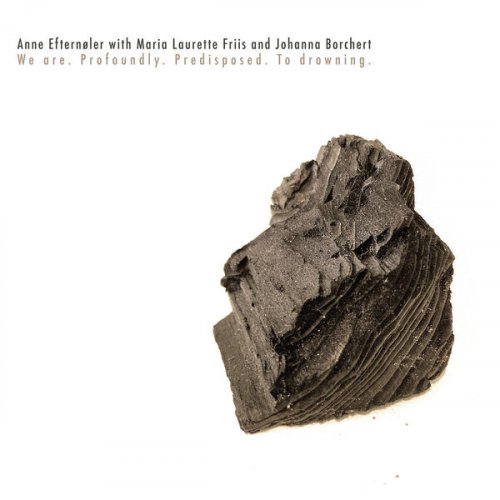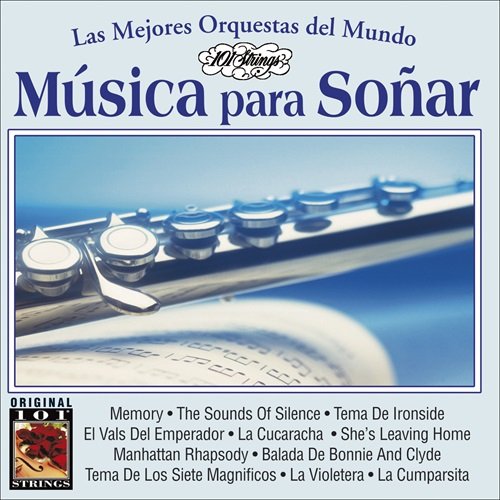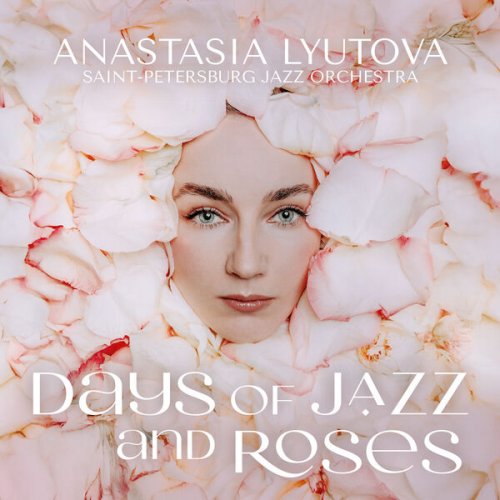Riccardo Muti - Verdi: Aida (2010)
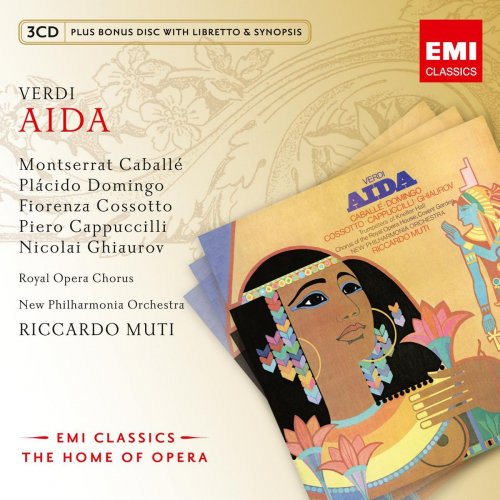
Artist: Riccardo Muti
Title: Verdi: Aida
Year Of Release: 2010
Label: EMI Classics
Genre: Classical
Quality: FLAC (tracks)
Total Time: 02:25:55
Total Size: 759 Mb
WebSite: Album Preview
Tracklist: Title: Verdi: Aida
Year Of Release: 2010
Label: EMI Classics
Genre: Classical
Quality: FLAC (tracks)
Total Time: 02:25:55
Total Size: 759 Mb
WebSite: Album Preview
CD 1
1.1 Prelude 3:40
Act One - Scene One
1.2 Si, corre voce che l'etiope ardisca 1:35
1.3 Se quel guerrier io fossi! 0:56
1.4 Celeste Aida 3:23
1.5 Quale insolita gioia nel tuo squardo! 3:18
1.6 Vieni, o diletta, appressati 2:45
1.7 Alta cagion v'aduna 3:24
1.8 Su! del Nilo al sacro lido 3:08
1.9 Ritorna vincitor! 3:09
1.10 I sacri nomi di padre, d'amante 3:20
Act One - Scene Two
1.11 Possente, possente Ftha 3:25
1.12 Danza sacra delle sacerdotesse 2:11
1.13 Mortal, diletto ai numi 1:07
1.14 Nume, custode e vindice 4:17
CD 2
Act Two - Scene One
2.1 Chi mai fra gl'inni e i plausi 2:52
2.2 Danza degli schiavi mori 1:26
2.3 Vieni, sui crin ti piovano 1:37
2.4 Fu la sorte dell'armi a' tuoi funesta 2:39
2.5 Ebben, qual nuovo fremito t'assal, gentile Aida? 2:55
2.6 Pieta ti prenda del mio dolor 1:55
2.7 Su! del Nilo al sacro lido 2:49
Act Two - Scene Two
2.8 Gloria all'Egitto, ad Iside 3:02
2.9 Marcia trionfale 1:26
2.10 Ballabile 4:06
2.11 Vieni, o guerriero vindice 2:19
2.12 Salvator della patria 2:11
2.13 Che veggo! Egli? Mio padre! 1:51
2.14 Ma tu, Re, tu signore possente 1:44
2.15 Il dolor che in quel volto favella 2:42
2.16 O Re, pei sacri numi 2:35
2.17 Gloria all'Egitto, ad Iside 2:59
CD 3
Act Three
3.1 O tu che sei d'Osiride 2:12
3.2 Vieni d'Iside al tempio 2:12
3.3 Qui Radames verra! 1:36
3.4 O patria mia 5:16
3.5 Ciel! mio padre! 2:41
3.6 In armi ora si desta il popol nostro 2:51
3.7 Padre, a costoro schiava non sono 2:34
3.8 Pur ti riveggo, mia dolce Aida 1:27
3.9 Nel fiero anelito di nuova guerra 1:51
3.10 Fuggiam gli ardori inospiti... La, tra foreste vergini 4:29
3.11 Aida!... Tu non m'ami 2:05
3.12 Ma, dimmi: per quale via 2:25
3.13 Traditor!... La mia rival! 1:02
Act Four - Scene One
3.14 L'aboritta rivale a me sfuggia 3:17
3.15 Gia i sacerdoti adunansi 3:33
3.16 No, vive Aida!... Vive! 3:00
3.17 Ohime! morir mi sento! 2:39
3.18 Spirto del nume, sovra noi discendi! 1:52
3.19 Radames, Radames, Radames 3:51
3.20 A lui vivo, la tomba! 3:36
Act Four - Scene Two
3.21 La fatal pietra sovra me si chiuse 2:11
3.22 Presago il core della tua condanna 1:55
3.23 Vedi? Di morte l'angelo 1:46
3.24 O terra, addio 4:45
Performers:
Aida – Montserrat Caballé
Amneris – Fiorenza Cossotto
Amonasro – Piero Cappuccilli
Il Re D'egitto – Luigi Roni
Radames – Placido Domingo
Ramtis – Nicolai Ghiaurov
Un Messaggero – Nicola Martinucci
Una Sacerdotessa – Esther Casas
Chorus Of The Royal Opera House, Covent Garden
Chorus Master – Douglas Robinson
New Philharmonia Orchestra
Conductor – Riccardo Muti
There was certainly no lack of talent in the opera world in the 1970s, and this magnificent recording stands in eloquent testimony to that fact. Aida is often performed and often recorded, and most opera fans will have their favorite performers of this great Verdi opera. I would be hard pressed to come up with a "best" Aida, or a "best" Rhadames. We are just lucky that this recording features many truly first rank artists caught at the peak of their vocal powers. And a great conductor at the outset of his distinguished career.
Montserrat Caballe was truly at her best in the 70's, and her best has to be heard to be believed. While many would not consider her the ideal Aida voice, she more than rises to the occasion here and reveals a lush, rich voice with power to spare, capable of spinning out Verdi's long, passionate lines with ease. She apparently seldom had to breathe, and chooses spacious tempi which allow her to really relish every phrase. She is great in the big arias, but perhaps even better in the ensembles, where I suspect some well chosen miking may have helped out a little. But she's best in the many duets in this opera. Her long scene with Amneris is stunning, as is the Nile scene with first her father, then Rhadames. She is positively seductive when coaxing Rhadames to flee Egypt with her, and her ravishing voice simply scintillates as no other I've ever heard. Her incredible soft singing, showing many different shades of soft from p to pp to ppp to a true pppp simply has to be heard to be believed. And what tone she uses as she holds onto these soft notes until they seem to detach from her throat and hang suspended in mid air somewhere over her head ... like a glistening crystal bubble spinning in space. I have never heard anyone do this before, not Muzio, not Gencer (although she came awfully close), not Milanov. The effect of these splendid pianissimi raises the hair on the back of my neck and quite literally takes my breath away. I've seen Caballe do this in person, and I know that this is NOT the effect of a little over engineering. She really could sing like this, and still be heard in the back of the house.
Placido Domingo is also heard here to wonderful effect. He was in superb voice and easily rises to the many challenges of this great role. His big moment as he surrenders his sword after helping Aida and her father escape is, indeed, very big. His voice rings out effortlessly and would have been a real showstopper in the opera house. But perhaps his greatest achievement, and it is incredibly great, is the superb Tomb Scene that ends the opera. This is Verdi at his finest, and in the hands of Domingo and Caballe I felt as though I was hearing this music for the first time. Both separately and together, they are both simply amazing. But the final phrases of "O terra addio" are simply, undeniably exquisite. Domingo at times in this scene is singing in full voice, expressing his distress at finding Aida buried alive in the tomb with him. Caballe answers him softly, magnificently, calming him, caressing him with her voice. And in the final lines, unexpectedly and with great effect, Domingo suddenly softens his voice and matches Caballe's radiant tone nuance for nuance. Hearing both of them caress those final notes while Cossotto intones her prayer for peace from outside the tomb ... well, you'll have to hear what they do with this music yourself. This is great opera at its absolute best.
And Muti, well, he's simply inspired from start to finish. I suspect he knew how great his singers were in the recording studio, and he gives an expansive reading of the score that allows them plenty of room to work while at the same time propelling the drama along in all the key places. The ballet music is wonderful, and the power and drama of the great Triumphal Scene with its vast cast of characters is truly compelling. This scene is one of my favorites, giving each character something to do as each expresses their own thoughts while all are singing together. It's Grand Opera at its finest, and Verdi's music here is among the finest moments of opera I've ever heard. This is big, big sound, all clearly recorded and each voice clearly audible. While I still couldn't say what recording is "best", this reading of the score is certainly one of the front runners. I don't think you'll be disappointed with anything in this Aida.
Cossotto is, as usual, a solid and moving Amneris. Her voice is well known to most opera lovers, and she is in characteristic form here. She knew this role well, and performs it admirably. All the male roles are equally well done, although I could have asked for a bit more bite and contempt from Cappucilli in the Nile scene. He's telling Aida she's no longer his daughter, and is just a slave of the Pharoahs. You get some ire here, but not quite the total denouncement for which I'm looking. I mean, he's being deliberately manipulative at his point, afraid he won't convince Aida to betray her lover. I would like just a bit of overacting and sheer DRAMA at this point. I get just that from Caballe's response to his words, as she is very much in character throughout this entire scene.
The recording is well engineered, and a delight to play really loudly on a good audio system. It will give the best system a real workout, and make you glad you invested in a system which can do this dynamic performance full justice. Whatever your preferences for Verdi opera may be, you owe it to yourself to hear this reading of Aida. Great Verdi, great singers, great conductor, great orchestra. It just doesn't get much better than this.
Montserrat Caballe was truly at her best in the 70's, and her best has to be heard to be believed. While many would not consider her the ideal Aida voice, she more than rises to the occasion here and reveals a lush, rich voice with power to spare, capable of spinning out Verdi's long, passionate lines with ease. She apparently seldom had to breathe, and chooses spacious tempi which allow her to really relish every phrase. She is great in the big arias, but perhaps even better in the ensembles, where I suspect some well chosen miking may have helped out a little. But she's best in the many duets in this opera. Her long scene with Amneris is stunning, as is the Nile scene with first her father, then Rhadames. She is positively seductive when coaxing Rhadames to flee Egypt with her, and her ravishing voice simply scintillates as no other I've ever heard. Her incredible soft singing, showing many different shades of soft from p to pp to ppp to a true pppp simply has to be heard to be believed. And what tone she uses as she holds onto these soft notes until they seem to detach from her throat and hang suspended in mid air somewhere over her head ... like a glistening crystal bubble spinning in space. I have never heard anyone do this before, not Muzio, not Gencer (although she came awfully close), not Milanov. The effect of these splendid pianissimi raises the hair on the back of my neck and quite literally takes my breath away. I've seen Caballe do this in person, and I know that this is NOT the effect of a little over engineering. She really could sing like this, and still be heard in the back of the house.
Placido Domingo is also heard here to wonderful effect. He was in superb voice and easily rises to the many challenges of this great role. His big moment as he surrenders his sword after helping Aida and her father escape is, indeed, very big. His voice rings out effortlessly and would have been a real showstopper in the opera house. But perhaps his greatest achievement, and it is incredibly great, is the superb Tomb Scene that ends the opera. This is Verdi at his finest, and in the hands of Domingo and Caballe I felt as though I was hearing this music for the first time. Both separately and together, they are both simply amazing. But the final phrases of "O terra addio" are simply, undeniably exquisite. Domingo at times in this scene is singing in full voice, expressing his distress at finding Aida buried alive in the tomb with him. Caballe answers him softly, magnificently, calming him, caressing him with her voice. And in the final lines, unexpectedly and with great effect, Domingo suddenly softens his voice and matches Caballe's radiant tone nuance for nuance. Hearing both of them caress those final notes while Cossotto intones her prayer for peace from outside the tomb ... well, you'll have to hear what they do with this music yourself. This is great opera at its absolute best.
And Muti, well, he's simply inspired from start to finish. I suspect he knew how great his singers were in the recording studio, and he gives an expansive reading of the score that allows them plenty of room to work while at the same time propelling the drama along in all the key places. The ballet music is wonderful, and the power and drama of the great Triumphal Scene with its vast cast of characters is truly compelling. This scene is one of my favorites, giving each character something to do as each expresses their own thoughts while all are singing together. It's Grand Opera at its finest, and Verdi's music here is among the finest moments of opera I've ever heard. This is big, big sound, all clearly recorded and each voice clearly audible. While I still couldn't say what recording is "best", this reading of the score is certainly one of the front runners. I don't think you'll be disappointed with anything in this Aida.
Cossotto is, as usual, a solid and moving Amneris. Her voice is well known to most opera lovers, and she is in characteristic form here. She knew this role well, and performs it admirably. All the male roles are equally well done, although I could have asked for a bit more bite and contempt from Cappucilli in the Nile scene. He's telling Aida she's no longer his daughter, and is just a slave of the Pharoahs. You get some ire here, but not quite the total denouncement for which I'm looking. I mean, he's being deliberately manipulative at his point, afraid he won't convince Aida to betray her lover. I would like just a bit of overacting and sheer DRAMA at this point. I get just that from Caballe's response to his words, as she is very much in character throughout this entire scene.
The recording is well engineered, and a delight to play really loudly on a good audio system. It will give the best system a real workout, and make you glad you invested in a system which can do this dynamic performance full justice. Whatever your preferences for Verdi opera may be, you owe it to yourself to hear this reading of Aida. Great Verdi, great singers, great conductor, great orchestra. It just doesn't get much better than this.
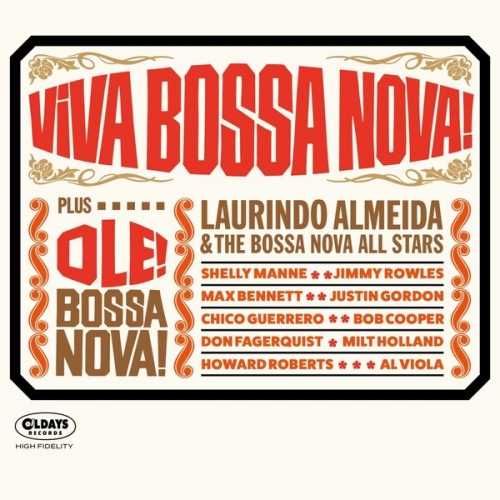
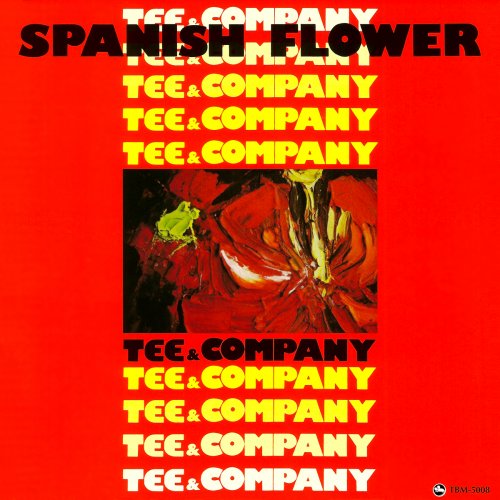
![Joe Pass - Virtuoso (1974) [2025 DSD256] Joe Pass - Virtuoso (1974) [2025 DSD256]](https://www.dibpic.com/uploads/posts/2026-02/1771609997_ff.jpg)
![Bop Juice - Live at Smalls (2026) [Hi-Res] Bop Juice - Live at Smalls (2026) [Hi-Res]](https://www.dibpic.com/uploads/posts/2026-02/1771597003_cover.jpg)
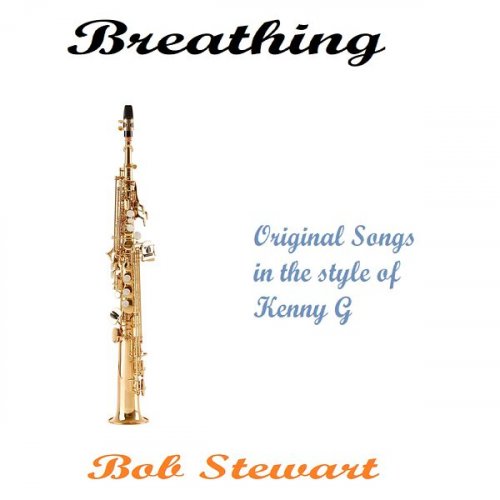
![Eero Koivistoinen - For Children (1970) [2006] Eero Koivistoinen - For Children (1970) [2006]](https://www.dibpic.com/uploads/posts/2026-02/1771615516_ff.jpg)
